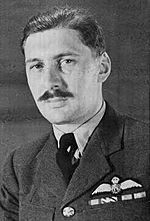James O'Meara facts for kids
Quick facts for kids
James Joseph O'Meara
|
|
|---|---|

James Joseph O'Meara
|
|
| Nickname(s) | "Orange" |
| Born | 20 February 1919 Barnsley, Yorkshire, England |
| Died | 5 July 1974 (aged 55) Barnstaple, Devon, England |
| Allegiance | United Kingdom |
| Service/ |
Royal Air Force |
| Years of service | 1938–1945 1950–1959 |
| Rank | Squadron Leader |
| Commands held | No. 131 Squadron RAF (1943–44) |
| Battles/wars | Second World War |
| Awards | Distinguished Service Order Distinguished Flying Cross & Bar Mentioned in Despatches |
James Joseph "Orange" O'Meara (born February 20, 1919 – died July 5, 1974) was a brave fighter pilot for the Royal Air Force during the Second World War. He became a famous "flying ace" during the Battle of Britain, which was a major air battle. By the end of the war, he had shot down 11 enemy planes by himself, and shared credit for two more. He also likely destroyed four others and damaged many more.
Contents
Early Life and Flying Dreams
James O'Meara was born in Barnsley, England, in 1919. From a young age, he loved airplanes and dreamed of flying. To save money for flying lessons, he worked as a bank clerk. He earned his pilot's license in 1937.
At 19, in April 1938, he joined the Royal Air Force (RAF). This was just before the Second World War began.
Wartime Adventures
First Missions
O'Meara's first active duty was with No. 64 Squadron RAF. On May 31, 1940, he achieved his first "kill" (shot down an enemy plane) over Dunkirk. He had already damaged another enemy plane earlier that month.
In July, he shot down another German plane over the English Channel. A few days later, he took down two more enemy planes while defending Dover.
Battle of Britain Hero
During the intense Battle of Britain in August 1940, O'Meara was very active. He claimed two more enemy planes as "probables" (likely destroyed) and destroyed another the next day. He also damaged three German bombers.
Soon after, he moved to No. 72 Squadron RAF. He was promoted to flying officer in September 1940.
Awards for Bravery
O'Meara was awarded the Distinguished Flying Cross (DFC) on September 24, 1940. This award recognized his great skill and dedication. The official report said he had destroyed at least six enemy aircraft and was a fantastic example to others.
He later moved to help train new pilots. In November 1940, he shot down a German rescue plane and a fighter-bomber. He was shot down himself in February 1941 but managed to crash-land safely.
He received a Bar (an extra award) to his DFC in March 1941. This was for his continued excellent work as a fighter pilot. By this time, he had destroyed at least 11 enemy aircraft.
Later War Service
By late April 1941, he had destroyed another enemy plane. In September, he was promoted to flight lieutenant. He then returned to No. 64 Squadron RAF as a flight commander.
After a break from active flying, he served in Nigeria for a short time in 1942. He then became a liaison officer, connecting the RAF with the Army.
In April 1943, O'Meara was given command of No. 131 Squadron RAF. He flew 170 missions and damaged another German plane in August 1943.
In October 1944, he was awarded the Distinguished Service Order (DSO). This was an even higher award for his long and brave service. The award recognized his leadership and how he helped his squadron perform well. By the end of the war, his total score was 11 enemy planes destroyed, 2 shared destroyed, 4 probables, and 11 damaged.
After the war, O'Meara worked in civilian jobs for a few years. He then rejoined the RAF in 1950. He retired in 1959 as a Squadron Leader.
Life After the RAF
After leaving the RAF for good, O'Meara worked as an architect. He also ran several businesses, including a restaurant and a hotel in Cornwall.
James O'Meara passed away in 1974 in Barnstaple, England. He had been ill for several years with a liver infection he caught from a parasite while stationed in India. He is buried in Bideford.
 | Bessie Coleman |
 | Spann Watson |
 | Jill E. Brown |
 | Sherman W. White |

